Key takeaways:
- Firefighter training encompasses physical strength, mental resilience, teamwork, and strategic decision-making in high-pressure situations.
- Effective disaster preparedness significantly improves response efficiency and team confidence, fostering a collaborative culture of safety.
- Key skills for firefighters include physical fitness, problem-solving, and effective communication, all essential for successful emergency response.
- Avoid common training mistakes such as neglecting physical fitness, underestimating equipment familiarity, and allowing overconfidence to compromise safety.
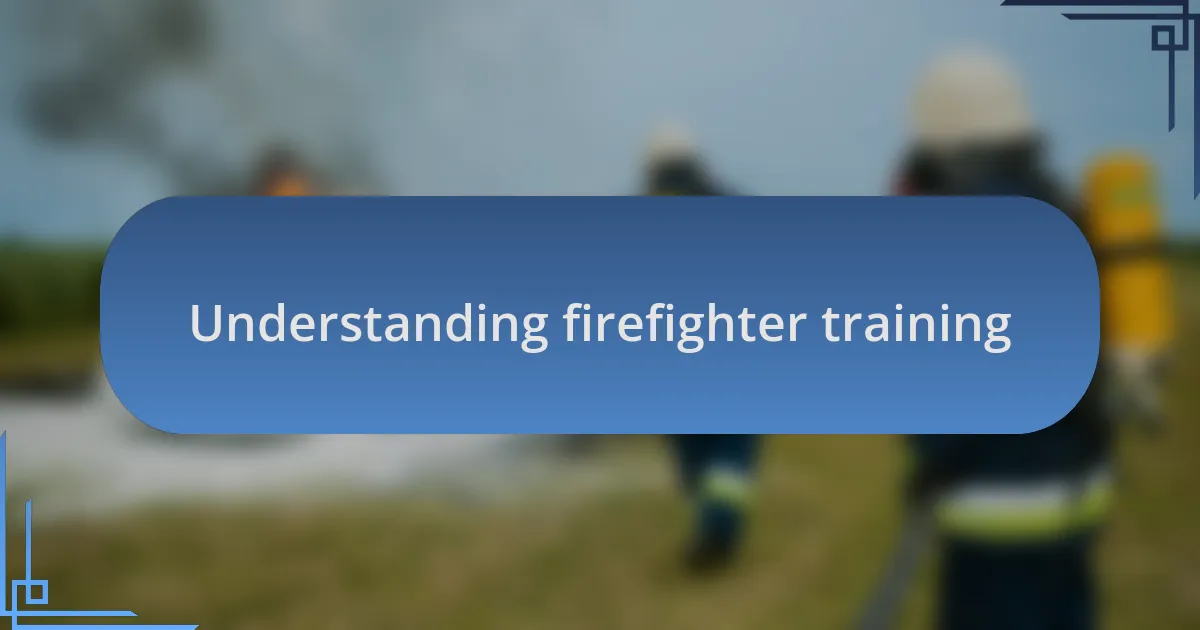
Understanding firefighter training
Firefighter training is an intricate process that goes beyond physical strength; it’s about building mental resilience and teamwork. I still remember my first week of training, overwhelmed by the sheer volume of information—from the technical aspects of equipment to the protocols for emergency response. Have you ever felt like there was so much to learn that it was almost paralyzing? That’s how I felt, but with each passing day, it became clearer just how vital this knowledge was for saving lives.
The emotional aspect of this training cannot be overlooked. I’ve witnessed colleagues break down after a tough day, only to rise stronger the next morning, ready to support one another. It’s a reminder that we’re not just training as individuals; we’re forming deep bonds that become our lifelines in crisis situations. Can you imagine trusting your life with someone who could be your best friend? That’s the essence of firefighter training—it prepares you to face the flames and the fears, together.
Moreover, understanding the science behind firefighting techniques is crucial. When I first learned about fire behavior—how it spreads and changes—I felt a sense of empowerment. Knowing how to predict and counteract fire dynamics can mean the difference between life and death. Have you ever considered how important it is to not just act quickly but to act wisely? This training emphasizes strategy as much as speed, crafting firefighters who are not only brave but also smart in their approach to danger.
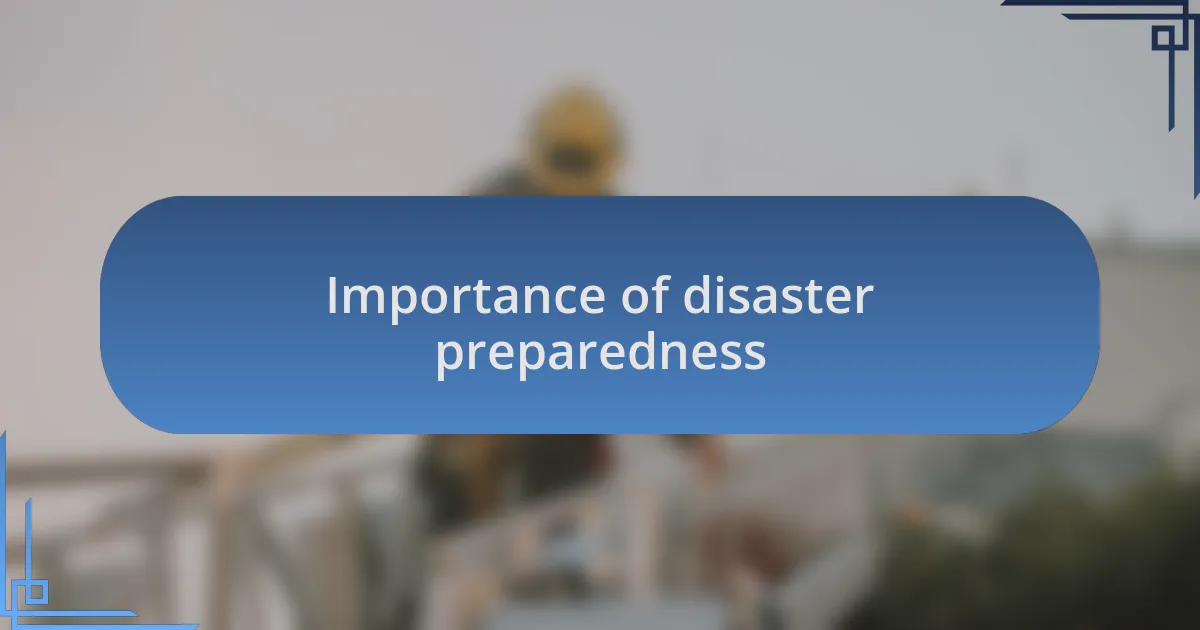
Importance of disaster preparedness
Disaster preparedness is crucial, as it equips individuals and communities with the tools and knowledge they need to respond effectively in crisis situations. I remember a time when a small local fire quickly escalated into a larger threat due to a lack of coordinated response—the chaos could have been minimized with proper planning. Have you ever thought about how vital it is to have a plan before disaster strikes? It’s one of those things that’s easy to overlook, but it can create a world of difference.
Being prepared not only improves response efficiency but also boosts confidence among team members. I’ve seen firsthand how a well-prepared group can tackle challenges with poise, while a reactive approach often leads to panic and disarray. When you know what to expect and have practiced your response, it’s like stepping into a role you’ve trained for, rather than being caught off guard. Isn’t it reassuring to think that being proactive can save lives?
Additionally, I find that effective disaster preparedness fosters a culture of safety and collaboration. In my experience, training together creates shared understanding and builds trust, making it easier to communicate during emergencies. Reflecting on those moments when we came together under pressure solidifies the idea that we’re only as strong as our weakest link. Isn’t it empowering to know that by preparing together, we can significantly increase our chances of overcoming the unexpected?
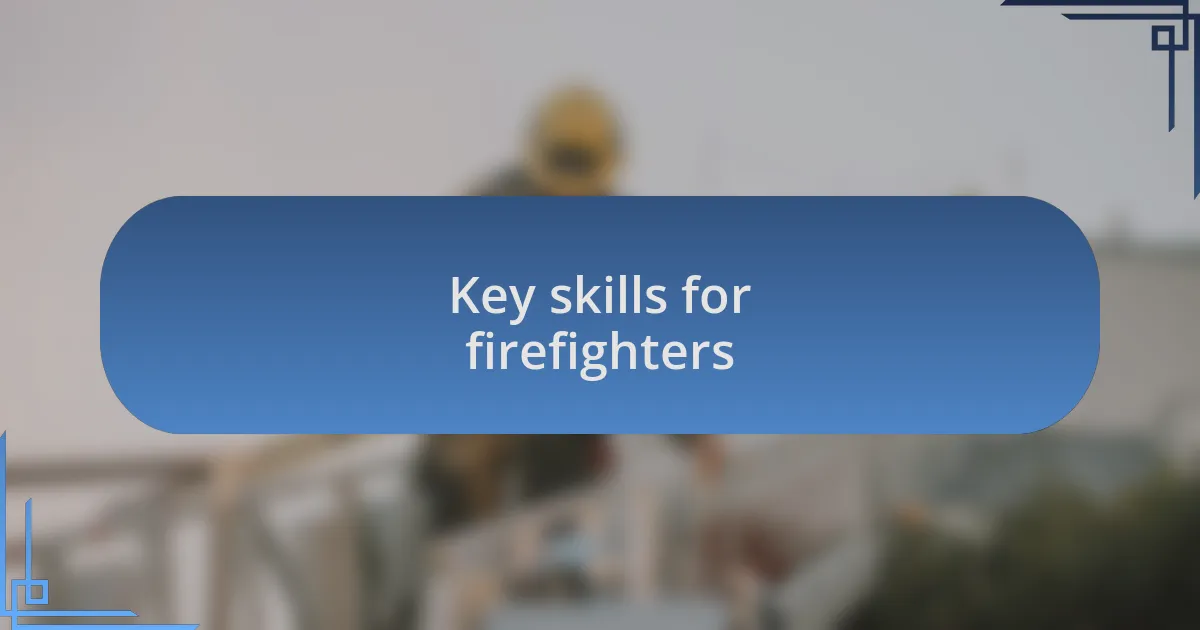
Key skills for firefighters
Firefighting demands a unique blend of physical and mental skills that are crucial for success in high-pressure situations. During my own training, I quickly learned the importance of physical fitness—not just for carrying heavy gear, but for maintaining endurance when facing grueling conditions. Have you ever felt the strain of an intense workout? Imagine that feeling while trying to put out a blazing inferno. That’s the reality firefighters face daily.
Problem-solving is another key skill that often gets overshadowed by the more obvious physical requirements. I remember an incident where a sudden shift in wind direction created a new path for flames, altering our entire approach at the scene. It was in that moment that quick-thinking and adaptability were essential. Can you see how crucial it is to think on your feet when lives are at stake?
Effective communication stands out as an invaluable asset as well. I once participated in a training exercise where clear communication among my team led us to successfully execute a complicated rescue operation. Reflecting on those moments made me realize that every shout and signal counts—it can mean the difference between chaos and cohesion. How often do we underestimate the power of words in a crisis? The ability to convey precise information swiftly can be lifesaving, and it’s a skill that every firefighter must prioritize.
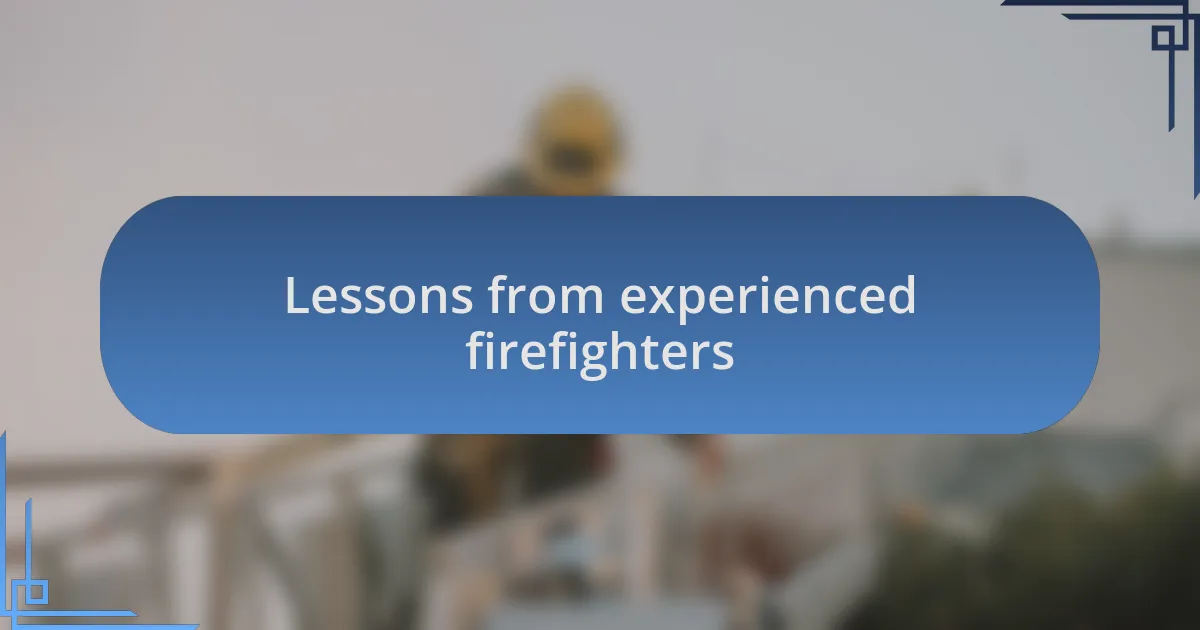
Lessons from experienced firefighters
The wisdom shared by seasoned firefighters often hinges on the value of experience in unpredictable situations. I vividly remember my mentor emphasizing the need to always expect the unexpected. He once faced a situation where a residential fire escalated quickly due to hidden propane tanks. That taught me the necessity of situational awareness—knowing your environment and preparing for sudden changes can be life-saving.
Time management is another lesson that consistently surfaces in conversations with veterans. One firefighter shared a harrowing story about nearly running out of air while trying to reach a trapped victim. In that moment, he realized how critical it is to balance urgency with the need for careful planning. Have you ever felt the pressure to act quickly while also needing to think strategically? It’s a delicate dance that can sometimes mean the difference between life and death.
Moreover, the emotional toll of the job is something we often overlook. I once spoke with a veteran who reflected on a particularly challenging call that stayed with him for years. His story highlighted the importance of mental health and peer support in coping with the stresses of firefighting. Isn’t it fascinating how sharing these experiences with others can foster resilience and strength in a field that frequently faces trauma? It reinforces the idea that we’re all in this together, navigating the challenges as a unified front.
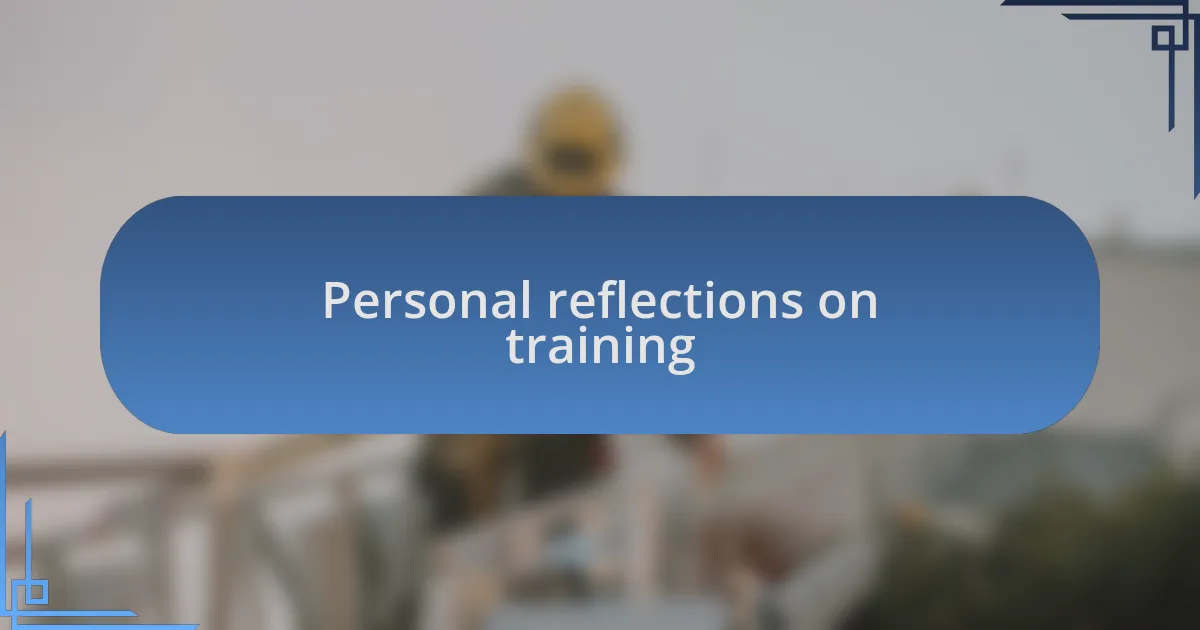
Personal reflections on training
Training as a firefighter isn’t just about mastering techniques; it’s also a profound journey of self-discovery. I remember my first hands-on drill, fumbling with the equipment, feeling the weight of my responsibility. That moment of uncertainty taught me how crucial it is to embrace vulnerability. Have you ever felt that mix of fear and excitement? It’s those raw emotions that become the foundation for building true confidence under pressure.
As I immersed myself in training, I quickly learned that every practice run has a lesson buried within it. During a live burn, I found myself caught off guard by the heat and chaos. The adrenaline surged, but I also realized how vital it was to breathe and stay focused. Reflecting on that experience, I appreciate how our training simulations mimic real-life scenarios. They not only prepare us physically but challenge us mentally. Isn’t it fascinating how amidst the chaos, calm can be cultivated?
Looking back, I wish I had prioritized teamwork earlier in my training. I was initially hesitant to rely on my colleagues, believing I should prove myself independently. However, during a complex drill, I learned that collaboration is what truly enhances performance. This acted as a turning point for me—understanding that our strength lies in unity. Have you considered how supporting each other fosters an environment where everyone thrives? It’s a lesson I carry with me every day on the line.
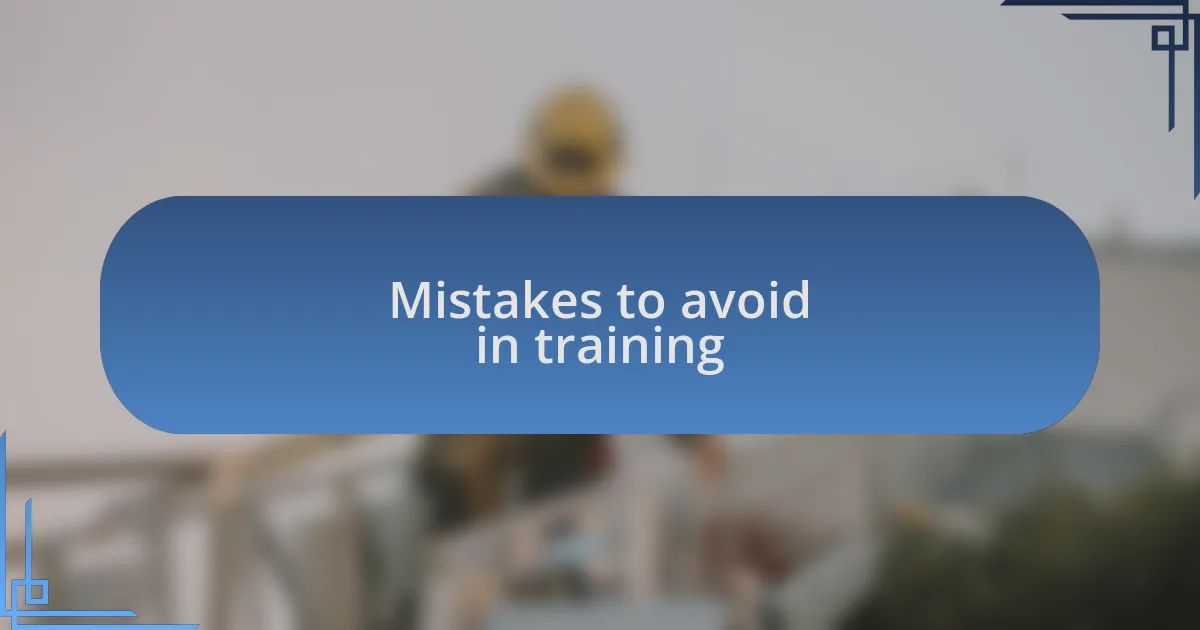
Mistakes to avoid in training
Training can be a grueling process, and one mistake I made early on was neglecting physical fitness. I thought that basic drills would suffice, but during a simulation involving heavy gear, I struggled to keep pace. It’s crucial to remember that our bodies are our most vital tools; if we don’t maintain them, we risk our ability to respond effectively in real emergencies. Have you ever felt out of breath when you needed to perform at your best?
Another misstep I encountered was underestimating the importance of equipment familiarity. The first time I donned the SCBA (self-contained breathing apparatus), I was overwhelmed. I barely understood how to adjust the straps, let alone operate the device in a crisis. That experience taught me that thorough knowledge of our gear can save precious seconds during an emergency. Have you taken the time to practice with your equipment until it feels like a second skin?
I also learned the hard way that overconfidence can be a dangerous trap. One day during a ladder drill, I felt invincible and skipped some safety checks. When I reached the top, the realization hit me that I had ignored fundamental protocols. That moment was humbling. It underscored the importance of always following procedures, no matter how experienced we become. Have you found yourself letting your guard down in areas you thought you had nailed?
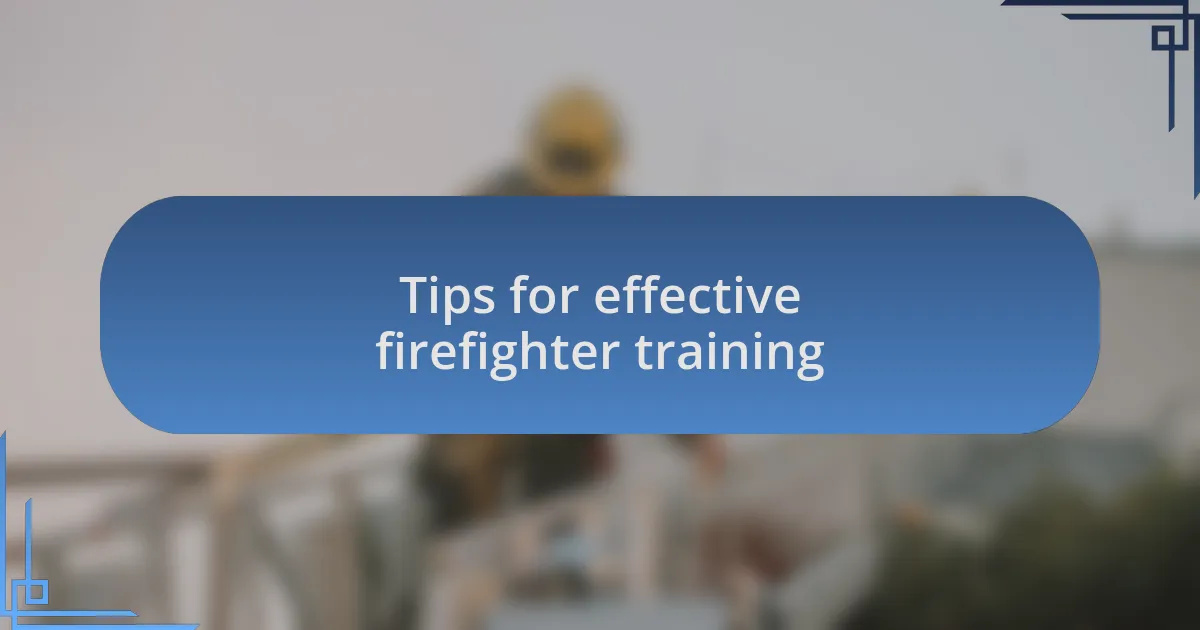
Tips for effective firefighter training
One of the best tips I can share for effective firefighter training is to embrace a culture of continuous learning. Early on, I took part in a training workshop that focused on advanced tactics, and it opened my eyes. I realized that even on off-days or when I felt confident in my skills, there was always something new to learn. How often do you challenge yourself to dive deeper into your knowledge?
Another crucial element is the importance of teamwork. During a live burn exercise, our crew worked together seamlessly, and it made all the difference. I remember one moment when we faced a simulated victim rescue. Each member played a specific role, and our efficiency was evident. When was the last time you intentionally practiced coordinating with your team?
Lastly, stress management techniques can take your training to the next level. I once participated in a high-pressure scenario where I had to calmly navigate chaos, and it was a game-changer. Learning to breathe deeply and focus even when the heat is on really enhances performance. Have you considered how handling stress in training prepares you for real-life situations?